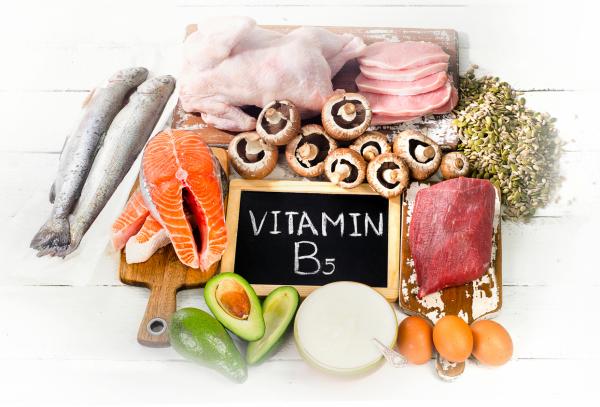Vitamin B5, or pantothenic acid, is a water-soluble vitamin that performs different functions in the body, all of vital importance. It is directly related to the metabolism of fats, because it is involved in their transformation and absorption, being essential in the process that allows us to transform the food we eat into the energy we need to carry out our vital functions and daily activities. Vitamin B5 is a precursor of coenzyme A and is also involved in the synthesis of hormones such as melatonin. Fortunately, there are many foods that contain this micronutrient, present in the composition of the cells of practically all animal and plant tissues (in fact ‘pantos' means ‘present everywhere') but some have more amounts than others.

What are the foods rich in vitamin B5
Although you can find pantothenic acid in numerous food supplements, in reality, a varied and balanced diet provides the daily amounts of vitamin B5 that a healthy body requires, especially if that diet does not lack foods that include more vitamin B5 in their composition among that stand out:
- beef . Although in varying amounts, depending on the different pieces, beef or veal is a natural source of vitamin B5. As an example, a beef tenderloin fillet would provide 13 ug./100 grams.
- Chicken meat . High in protein and low in fat, chicken meat is rich in B vitamins and minerals such as phosphorus, potassium and calcium. To its healthy composition, we must add its contribution in vitamin B5.
- Viscera. Within the group of foods of animal origin that contain the most vitamin B5, organ meats, especially chicken livers and calf liver, are the two most notable.
- Eggs . The egg, mainly the chicken egg, is a superfood that concentrates all the essential amino acids that the body needs, and is also an excellent source of protein of high biological value. In its extraordinary composition, a considerable dose of vitamin B5 could not be missing, present, in larger quantities, in the yolk.
- Milk and derivatives. Cow's milk and especially some types of cheese, such as Roquefort, Camembert or blue cheese, are also foods to include in a diet that provides extra vitamin B5.
- Vegetables . Pantothenic acid is also present in considerable amounts in many plant-based foods, so a person following a vegan or vegetarian diet will have no trouble getting the amounts their body needs to stay healthy. The vegetables that contain the most vitamin B5 are: potatoes , avocado , mushrooms and other types of mushrooms, especially shiitake mushrooms, and broccoli . Similarly, some legumes, especially the different varieties of chickpeas, are also a source of vitamin B5. As for nuts, peanuts and Sunflower seeds are two of the ones that contain the most pantothenic acid.
- Whole grains . Whole wheat, rice and oats (with germ and bran) are an excellent option to start the day with a breakfast rich in vitamin B5.
Benefits of vitamin B5
If you wonder what vitamin B5 is for, you should know that pantothenic acid plays an important role in keeping the body healthy and with enough energy and vitality for its own well-being. Next, I reveal to you what function vitamin B5 has in our body:
- It intervenes in the correct metabolism of the different macronutrients : carbohydrates, protein and fats, being especially important in the case of the latter group, since its action focuses on maintaining the correct absorption and the ideal balance of lipids. In fact, it is estimated that adequate levels of vitamin B5 help keep the ‘bad' cholesterol (LDL) at bay, without decreasing the good (HDL) in the bloodstream.
- It contributes to the proper functioning of the adrenal glands (also called anti-stress hormones) by slowing down the oxidative stress that cell membranes can suffer, triggering various pathologies.
- It favors the maintenance of the immune system and could help prevent and avoid pathologies and conditions related to the health of our skin.
What causes vitamin B5 deficiency
Presenting vitamin B5 deficiency is a rare pathology, precisely because obtaining the necessary amounts, through different foods, is something that is quite simple. Even so, there may be cases of diseases due to a lack of vitamin B5, either due to some type of hereditary disorder, which prevents the correct absorption of this micronutrient, or due to severe nutritional deficiencies.
Next, we will see the possible pathologies due to vitamin B5 deficiency:
- Migraines.
- Extreme tiredness for no reason that justifies it.
- Irritability .
- Pathologies related to the digestive system.
- Problems that affect the quality of sleep could be caused by a deficiency of vitamin B5, especially if they are accompanied by other symptoms.
- feeling of numbness
- Tingle.
- Burning in the extremities (hands and feet).
Given the typical symptoms caused by vitamin B5 deficiency, it is advisable to go to the doctor as soon as possible. Now, if you liked this article about foods with vitamin B5, we recommend you consult other posts such as:
- Foods rich in vitamin D
- Foods rich in vitamin A
- Foods rich in vitamin B12







